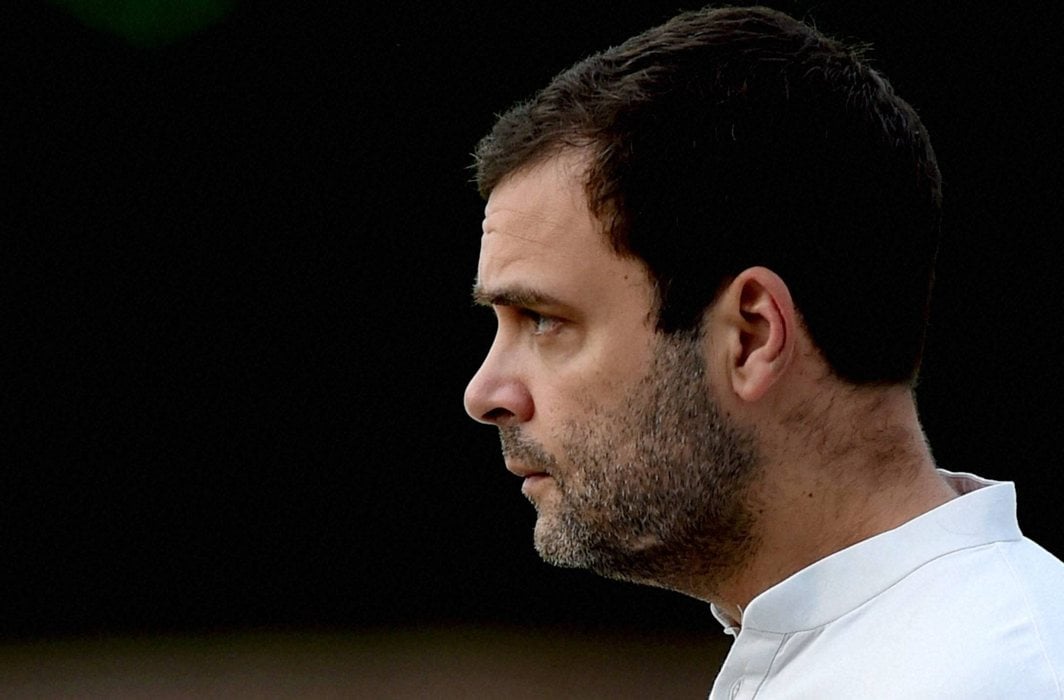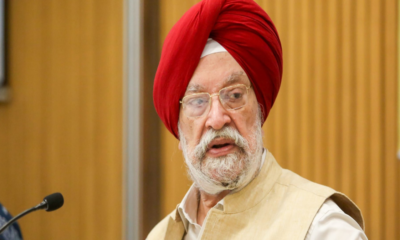[vc_row][vc_column][vc_column_text]
Rahul Gandhi files nomination: Congress vice president calls on former President Pranab Mukherjee, best wishes pour in from senior leaders amid allegations of the election being rigged
Amid allegations by a party worker that the process of his imminent elevation is rigged, Congress vice president Rahul Gandhi, on Monday, filed his nomination for the party’s presidential poll. In the absence of any other challenger, the Nehru-Gandhi scion is expected to be declared Congress president on Wednesday, once the deadline for scrutiny of nomination papers is completed.
[/vc_column_text][vc_raw_html]JTNDYmxvY2txdW90ZSUyMGNsYXNzJTNEJTIydHdpdHRlci10d2VldCUyMiUyMGRhdGEtbGFuZyUzRCUyMmVuJTIyJTNFJTNDcCUyMGxhbmclM0QlMjJlbiUyMiUyMGRpciUzRCUyMmx0ciUyMiUzRUElMjBuZXclMjBlcmElMjBiZWdpbnMlMkMlMjBhcyUyMENvbmdyZXNzJTIwVlAlMjBSYWh1bCUyMEdhbmRoaSUyMHByZXBhcmVzJTIwaGlzJTIwbm9taW5hdGlvbiUyMHBhcGVycyUyMGZvciUyMHRoZSUyMHBvc3QlMjBvZiUyMENvbmdyZXNzJTIwUHJlc2lkZW50JTIwYXQlMjBBSUNDLiUyMCUzQ2ElMjBocmVmJTNEJTIyaHR0cHMlM0ElMkYlMkZ0d2l0dGVyLmNvbSUyRmhhc2h0YWclMkZJbmRpYVdpdGhSYWh1bEdhbmRoaSUzRnNyYyUzRGhhc2glMjZhbXAlM0JyZWZfc3JjJTNEdHdzcmMlMjU1RXRmdyUyMiUzRSUyM0luZGlhV2l0aFJhaHVsR2FuZGhpJTNDJTJGYSUzRSUyMCUzQ2ElMjBocmVmJTNEJTIyaHR0cHMlM0ElMkYlMkZ0LmNvJTJGbWdGaWtiTmZwRiUyMiUzRXBpYy50d2l0dGVyLmNvbSUyRm1nRmlrYk5mcEYlM0MlMkZhJTNFJTNDJTJGcCUzRSUyNm1kYXNoJTNCJTIwQ29uZ3Jlc3MlMjAlMjglNDBJTkNJbmRpYSUyOSUyMCUzQ2ElMjBocmVmJTNEJTIyaHR0cHMlM0ElMkYlMkZ0d2l0dGVyLmNvbSUyRklOQ0luZGlhJTJGc3RhdHVzJTJGOTM3NTYxMjIxMDAzMjMxMjMyJTNGcmVmX3NyYyUzRHR3c3JjJTI1NUV0ZnclMjIlM0VEZWNlbWJlciUyMDQlMkMlMjAyMDE3JTNDJTJGYSUzRSUzQyUyRmJsb2NrcXVvdGUlM0UlMEElMEElM0NzY3JpcHQlMjBhc3luYyUyMHNyYyUzRCUyMmh0dHBzJTNBJTJGJTJGcGxhdGZvcm0udHdpdHRlci5jb20lMkZ3aWRnZXRzLmpzJTIyJTIwY2hhcnNldCUzRCUyMnV0Zi04JTIyJTNFJTNDJTJGc2NyaXB0JTNF[/vc_raw_html][vc_column_text]
While it is no secret that the outcome of the Congress’ presidential polls was pre-determined – perhaps as early as 2004 when Rahul Gandhi took the political plunge and was inducted into the party by his mother and incumbent party chief Sonia Gandhi as the general secretary – the election has attracted some controversy following allegations that the process was rigged.
Shehzad Poonawalla, a 31-year-old Secretary with the Maharashtra unit of the Congress who had burst onto the national media scene a few years ago – first as a Congress activist and then as a self-annointed party spokesperson – had last week alleged that Rahul Gandhi was being ‘selected and not elected’ as the party chief.
Shehzad, who is the younger brother of Tehseen Poonawalla, a Congress activist and known face in television debates, had leveled a series of allegations against the Congress party and Rahul while even as he challenged the Nehru-Gandhi scion to hold a free and fair election for the party chief’s post – on in which Shehzad wished to challenge Rahul. What made Shehzad’s outburst against Rahul – who is he said was being elevated only by the virtue of his Nehru-Gandhi lineage – even more piquant was that Tehseen is married to a cousin of Robert Vadra – the husband of Priyanka Gandhi and brother-in-law of Rahul. Tehseen was quick to “disown” Shehzad, declaring that his family had severed all ties with the younger Poonawalla and that he was unaware of the motivations behind the outburst.
While Shehzad’s claim of Rahul being elevated as Congress president only because he had a ‘Gandhi’ surname was like stating the obvious considering that sycophancy and loyalty towards the Nehru-Gandhis has been a hallmark of the Grand Old Party for nearly six decades, it was too exciting for Prime Minister Narendra Modi to not use the charge against Rahul while campaigning for the Gujarat assembly polls. On Saturday, Modi raked up the allegations leveled by Shehzad while he addressed poll rallies in his home state and used them as examples of the Congress’ ‘dynastic politics’.
Nevertheless, on Monday morning, as was expected, Rahul went ahead and filed his nomination for the party chief’s post. Prior to heading to the Congress headquarters on 24, Akbar Road for filing his nomination, the Nehru-Gandhi scion called on former President Pranab Mukherjee and former Prime Minister Dr Manmohan Singh to seek their blessings.
Dr Singh, along with a whole array of senior party leaders – Ghulam Nabi Azad, Mallikarjun Kharge, Ahmed Patel, Anand Sharma, Karnataka chief minister Siddaramaiah, and others – was present at the AICC headquarters when Rahul filed his nomination. Over 70 sets of nomination papers, supporting Rahul’s election to the party’s top post, were also submitted by senior leaders of the party and chief ministers of the few Congress-ruled states to Mullappally Ramachandran, the Returning Officer for the organisational election.
The Congress party also incessantly tweeted videos by senior party leaders congratulating Rahul Gandhi for the “historic” moment and elaborating on the virtues of his leadership.
[/vc_column_text][vc_raw_html]JTNDYmxvY2txdW90ZSUyMGNsYXNzJTNEJTIydHdpdHRlci12aWRlbyUyMiUyMGRhdGEtbGFuZyUzRCUyMmVuJTIyJTNFJTNDcCUyMGxhbmclM0QlMjJlbiUyMiUyMGRpciUzRCUyMmx0ciUyMiUzRUFzJTIwQ29uZ3Jlc3MlMjBWUCUyMFJhaHVsJTIwR2FuZGhpJTIwZmlsZXMlMjBoaXMlMjBub21pbmF0aW9uJTIwZm9yJTIwdGhlJTIwcG9zdCUyMG9mJTIwQ29uZ3Jlc3MlMjBQcmVzaWRlbnQlMkMlMjBzZW5pb3IlMjBsZWFkZXJzJTIwb2YlMjB0aGUlMjBJTkMlMjBmYW1pbHklMjBzZW5kJTIwdGhlaXIlMjBiZXN0JTIwd2lzaGVzJTIwYW5kJTIwZXhwcmVzcyUyMHdoeSUyMGhlJTIwaXMlMjB0aGUlMjBwZXJmZWN0JTIwbGVhZGVyLiUyMCUzQ2ElMjBocmVmJTNEJTIyaHR0cHMlM0ElMkYlMkZ0d2l0dGVyLmNvbSUyRmhhc2h0YWclMkZJbmRpYVdpdGhSYWh1bEdhbmRoaSUzRnNyYyUzRGhhc2glMjZhbXAlM0JyZWZfc3JjJTNEdHdzcmMlMjU1RXRmdyUyMiUzRSUyM0luZGlhV2l0aFJhaHVsR2FuZGhpJTNDJTJGYSUzRSUyMCUzQ2ElMjBocmVmJTNEJTIyaHR0cHMlM0ElMkYlMkZ0d2l0dGVyLmNvbSUyRmNhcHRfYW1hcmluZGVyJTNGcmVmX3NyYyUzRHR3c3JjJTI1NUV0ZnclMjIlM0UlNDBjYXB0X2FtYXJpbmRlciUzQyUyRmElM0UlMjAlM0NhJTIwaHJlZiUzRCUyMmh0dHBzJTNBJTJGJTJGdC5jbyUyRlgySkN6YzFlalQlMjIlM0VwaWMudHdpdHRlci5jb20lMkZYMkpDemMxZWpUJTNDJTJGYSUzRSUzQyUyRnAlM0UlMjZtZGFzaCUzQiUyMENvbmdyZXNzJTIwJTI4JTQwSU5DSW5kaWElMjklMjAlM0NhJTIwaHJlZiUzRCUyMmh0dHBzJTNBJTJGJTJGdHdpdHRlci5jb20lMkZJTkNJbmRpYSUyRnN0YXR1cyUyRjkzNzU1NDU3OTMxODc0MzA0MiUzRnJlZl9zcmMlM0R0d3NyYyUyNTVFdGZ3JTIyJTNFRGVjZW1iZXIlMjA0JTJDJTIwMjAxNyUzQyUyRmElM0UlM0MlMkZibG9ja3F1b3RlJTNFJTBBJTBBJTNDc2NyaXB0JTIwYXN5bmMlMjBzcmMlM0QlMjJodHRwcyUzQSUyRiUyRnBsYXRmb3JtLnR3aXR0ZXIuY29tJTJGd2lkZ2V0cy5qcyUyMiUyMGNoYXJzZXQlM0QlMjJ1dGYtOCUyMiUzRSUzQyUyRnNjcmlwdCUzRSUwQSUwQSUyMCUwQSUzQ2Jsb2NrcXVvdGUlMjBjbGFzcyUzRCUyMnR3aXR0ZXItdHdlZXQlMjIlMjBkYXRhLWxhbmclM0QlMjJlbiUyMiUzRSUzQ3AlMjBsYW5nJTNEJTIyZW4lMjIlMjBkaXIlM0QlMjJsdHIlMjIlM0VBcyUyME1yJTIwUmFodWwlMjBHYW5kaGklMjBmaWxlcyUyMGhpcyUyMG5vbWluYXRpb24lMkMlMjBJJTIwd2lzaCUyMGhpbSUyMHRoZSUyMHZlcnklMjBiZXN0JTIwYXMlMjBDb25ncmVzcyUyMFByZXNpZGVudC4lMjAlM0NhJTIwaHJlZiUzRCUyMmh0dHBzJTNBJTJGJTJGdHdpdHRlci5jb20lMkZoYXNodGFnJTJGSW5kaWFXaXRoUmFodWxHYW5kaGklM0ZzcmMlM0RoYXNoJTI2YW1wJTNCcmVmX3NyYyUzRHR3c3JjJTI1NUV0ZnclMjIlM0UlMjNJbmRpYVdpdGhSYWh1bEdhbmRoaSUzQyUyRmElM0UlM0MlMkZwJTNFJTI2bWRhc2glM0IlMjBQLiUyMENoaWRhbWJhcmFtJTIwJTI4JTQwUENoaWRhbWJhcmFtX0lOJTI5JTIwJTNDYSUyMGhyZWYlM0QlMjJodHRwcyUzQSUyRiUyRnR3aXR0ZXIuY29tJTJGUENoaWRhbWJhcmFtX0lOJTJGc3RhdHVzJTJGOTM3NTU0NTY0MjUyNzU4MDE2JTNGcmVmX3NyYyUzRHR3c3JjJTI1NUV0ZnclMjIlM0VEZWNlbWJlciUyMDQlMkMlMjAyMDE3JTNDJTJGYSUzRSUzQyUyRmJsb2NrcXVvdGUlM0UlMEElMEElM0NzY3JpcHQlMjBhc3luYyUyMHNyYyUzRCUyMmh0dHBzJTNBJTJGJTJGcGxhdGZvcm0udHdpdHRlci5jb20lMkZ3aWRnZXRzLmpzJTIyJTIwY2hhcnNldCUzRCUyMnV0Zi04JTIyJTNFJTNDJTJGc2NyaXB0JTNFJTBBJTBBJTIwJTBBJTNDYmxvY2txdW90ZSUyMGNsYXNzJTNEJTIydHdpdHRlci10d2VldCUyMiUyMGRhdGEtbGFuZyUzRCUyMmVuJTIyJTNFJTNDcCUyMGxhbmclM0QlMjJlbiUyMiUyMGRpciUzRCUyMmx0ciUyMiUzRUxlYWRlciUyMG9mJTIwT3Bwb3NpdGlvbiUyQyUyMFJhanlhJTIwU2FiaGElMjAlM0NhJTIwaHJlZiUzRCUyMmh0dHBzJTNBJTJGJTJGdHdpdHRlci5jb20lMkZBemFkR2h1bGFtTmFiaSUzRnJlZl9zcmMlM0R0d3NyYyUyNTVFdGZ3JTIyJTNFJTQwQXphZEdodWxhbU5hYmklM0MlMkZhJTNFJTIwc2VuZHMlMjBoaXMlMjB3aXNoZXMlMjB0byUyMENvbmdyZXNzJTIwVlAlMjBSYWh1bCUyMEdhbmRoaSUyMGFuZCUyMGhpZ2hsaWdodHMlMjB3aHklMjBoZSUyMGlzJTIwdGhlJTIwcGVyZmVjdCUyMGZpdCUyMGZvciUyMENvbmdyZXNzJTIwUHJlc2lkZW50LiUyMCUzQ2ElMjBocmVmJTNEJTIyaHR0cHMlM0ElMkYlMkZ0d2l0dGVyLmNvbSUyRmhhc2h0YWclMkZJbmRpYVdpdGhSYWh1bEdhbmRoaSUzRnNyYyUzRGhhc2glMjZhbXAlM0JyZWZfc3JjJTNEdHdzcmMlMjU1RXRmdyUyMiUzRSUyM0luZGlhV2l0aFJhaHVsR2FuZGhpJTNDJTJGYSUzRSUyMCUzQ2ElMjBocmVmJTNEJTIyaHR0cHMlM0ElMkYlMkZ0LmNvJTJGTnh5bmJtS0VCWiUyMiUzRXBpYy50d2l0dGVyLmNvbSUyRk54eW5ibUtFQlolM0MlMkZhJTNFJTNDJTJGcCUzRSUyNm1kYXNoJTNCJTIwQ29uZ3Jlc3MlMjAlMjglNDBJTkNJbmRpYSUyOSUyMCUzQ2ElMjBocmVmJTNEJTIyaHR0cHMlM0ElMkYlMkZ0d2l0dGVyLmNvbSUyRklOQ0luZGlhJTJGc3RhdHVzJTJGOTM3NTU1ODUwMzY0ODM3ODg4JTNGcmVmX3NyYyUzRHR3c3JjJTI1NUV0ZnclMjIlM0VEZWNlbWJlciUyMDQlMkMlMjAyMDE3JTNDJTJGYSUzRSUzQyUyRmJsb2NrcXVvdGUlM0UlMEElMEElM0NzY3JpcHQlMjBhc3luYyUyMHNyYyUzRCUyMmh0dHBzJTNBJTJGJTJGcGxhdGZvcm0udHdpdHRlci5jb20lMkZ3aWRnZXRzLmpzJTIyJTIwY2hhcnNldCUzRCUyMnV0Zi04JTIyJTNFJTNDJTJGc2NyaXB0JTNF[/vc_raw_html][vc_column_text]
Once elected, Rahul will replace his mother – Sonia Gandhi – as the Congress president. Sonia has been the longest-serving Congress president, having held the post for 19 consecutive years since she first assumed the role.
Rahul’s imminent coronation as Congress president – about four years after he was made the party vice president in January 2013 – will no doubt prove to be as the proverbial ‘crown of thorns’. Rahul will take over as party president at a time when the Congress has been reduced to just 45 seats in Lok Sabha – its lowest ever tally – and has been ousted from power in a majority of Indian States. Even when Sonia took over the party’s leadership in the face of the Congress’ dwindling popularity among the masses, the party had not faced such an erosion of support. Ironically, over the years, the Congress inability of reviving and building its electoral base has been blamed on the poor leadership of Rahul Gandhi, who since becoming party vice president in 2013, had begun to take control of party’s decision-making process in the wake of his mother’s deteriorating health.
Now, amid a perception that Rahul’s performance and popularity have both improved remarkably, he is preparing to take the hot seat. It remains to be seen if the euphoria will turn into gloom once the results for the Gujarat and Himachal Assembly polls are declared on December 18. Rahul has led the Congress’ Gujarat campaign – a state where the party has been out of power for the past 22 years – and though indications of a revival are not being outrightly dismissed even by the party’s harshest critics, a defeat in Narendra Modi and Amit Shah’s home turf will only help the BJP revive the attacks on Rahul’s lack of leadership qualities and his inability to deliver electoral victories for his fledgling party.
[/vc_column_text][/vc_column][/vc_row]


 India News19 hours ago
India News19 hours ago
 Latest world news19 hours ago
Latest world news19 hours ago
 Latest world news5 hours ago
Latest world news5 hours ago
 Latest world news4 hours ago
Latest world news4 hours ago
 India News4 hours ago
India News4 hours ago
 Latest world news4 hours ago
Latest world news4 hours ago
 India News4 hours ago
India News4 hours ago













